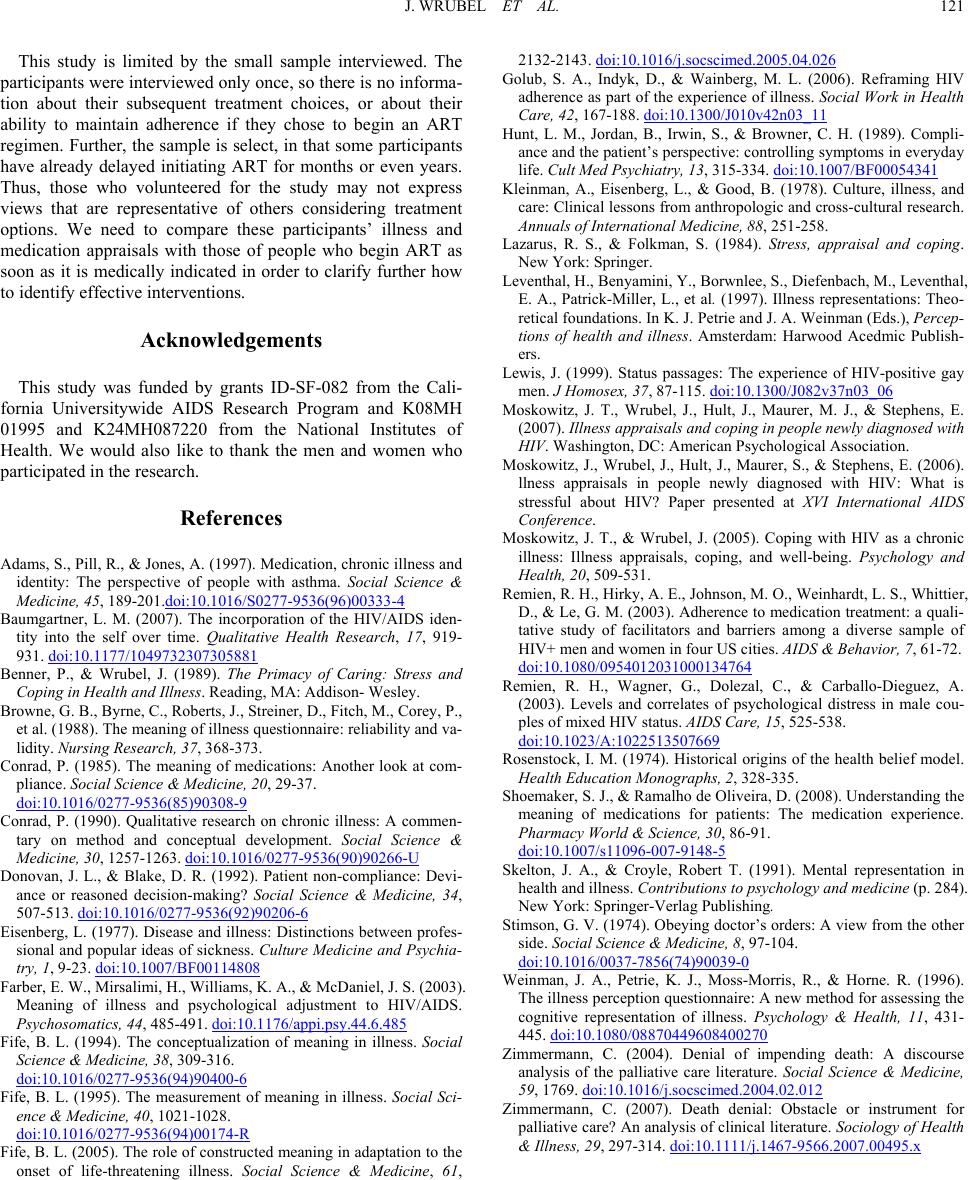
J. WRUBEL ET AL. 121
This study is limited by the small sample interviewed. The
participants were interviewed only once, so there is no informa-
tion about their subsequent treatment choices, or about their
ability to maintain adherence if they chose to begin an ART
regimen. Further, the sample is select, in that some participants
have already delayed initiating ART for months or even years.
Thus, those who volunteered for the study may not express
views that are representative of others considering treatment
options. We need to compare these participants’ illness and
medication appraisals with those of people who begin ART as
soon as it is medically indicated in order to clarify further how
to identify effec tive interventions.
Acknowledgements
This study was funded by grants ID-SF-082 from the Cali-
fornia Universitywide AIDS Research Program and K08MH
01995 and K24MH087220 from the National Institutes of
Health. We would also like to thank the men and women who
participated in the research.
References
Adams, S., Pill, R., & Jones, A. (1997). Medication, chronic illness and
identity: The perspective of people with asthma. Social Science &
Medicine, 45, 189- 201.doi:10.1016/S0277-9536(96)00333-4
Baumgartner, L. M. (2007). The incorporation of the HIV/AIDS iden-
tity into the self over time. Qualitative Health Research, 17, 919-
931. doi:10.1177/1049732307305881
Benner, P., & Wrubel, J. (1989). The Primacy of Caring: Stress and
Coping in Health and Illness. Reading, MA: Addison- Wesley.
Browne, G. B., Byrne, C., Roberts, J., Streiner, D., Fitch, M., Corey, P.,
et al. (1988). The meaning of illness questionnaire: reliability and va-
lidity. Nursing Research, 37, 368-373.
Conrad, P. (1985). The meaning of medications: Another look at com-
pliance. Social Science & Medicine, 20, 29-37.
doi:10.1016/0277-9536(85)90308-9
Conrad, P. (1990). Qualitative research on chronic illness: A commen-
tary on method and conceptual development. Social Science &
Medicine, 30, 1257- 1263. doi:10.1016/0277-9536(90)90266-U
Donovan, J. L., & Blake, D. R. (1992). Patient non-compliance: Devi-
ance or reasoned decision-making? Social Science & Medicine, 34,
507-513. doi:10.1016/0277-9536(92)90206-6
Eisenberg, L. (1977). Disease and illness: Distinctions between profes-
sional and popular ideas of sickness. Culture Medicine and Psychia-
try, 1, 9-23. doi:10.1007/BF00114808
Farber, E. W., Mirsalimi, H., Williams, K. A., & McDaniel, J. S. (2003).
Meaning of illness and psychological adjustment to HIV/AIDS.
Psychosomatics, 44, 485-491. doi:10.1176/appi.psy.44.6.485
Fife, B. L. (1994). The conceptualization of meaning in illness. Social
Science & Medicine, 38, 309-316.
doi:10.1016/0277-9536(94)90400-6
Fife, B. L. (1995). The measurement of meaning in illness. Social Sci-
ence & Medicine, 40, 1021-1028.
doi:10.1016/0277-9536(94)00174-R
Fife, B. L. (2005). The role of constructed meaning in adaptation to the
onset of life-threatening illness. Social Science & Medicine, 61,
2132-2143. doi:10.1016/j.socscimed.2005.04.026
Golub, S. A., Indyk, D., & Wainberg, M. L. (2006). Reframing HIV
adherence as part of the experience of illness. Social Work in Health
Care, 42, 167-188. doi:10.1300/J010v42n03_11
Hunt, L. M., Jordan, B., Irwin, S., & Browner, C. H. (1989). Compli-
ance and the patient’s perspective: controlling symptoms in everyday
life. Cult Med Psychiatry , 13, 315-334. doi:10.1007/BF00054341
Kleinman, A., Eisenberg, L., & Good, B. (1978). Culture, illness, and
care: Clinical lessons from anthropologic and cross-cultural research.
Annuals of International M e di c in e , 88, 251-258.
Lazarus, R. S., & Folkman, S. (1984). Stress, appraisal and coping.
New York: Springer.
Leventhal, H., Benyamini, Y., Borwnlee, S., Diefenbach, M., Leventhal,
E. A., Patrick-Miller, L., et al. (1997). Illness representations: Theo-
retical foundations. In K. J. Petrie and J. A. Weinman (Eds.), Percep-
tions of health and illness. Amsterdam: Harwood Acedmic Publish-
ers.
Lewis, J. (1999). Status passages: The experience of HIV-positive gay
men. J Homosex, 37, 87-115. doi:10.1300/J082v37n03_06
Moskowitz, J. T., Wrubel, J., Hult, J., Maurer, M. J., & Stephens, E.
(2007). Illness appraisals and coping in people newly diagnosed with
HIV. Washington, DC: American Psych ol og ic a l As s oc ia ti o n.
Moskowitz, J., Wrubel, J., Hult, J., Maurer, S., & Stephens, E. (2006).
llness appraisals in people newly diagnosed with HIV: What is
stressful about HIV? Paper presented at XVI International AIDS
Conference.
Moskowitz, J. T., & Wrubel, J. (2005). Coping with HIV as a chronic
illness: Illness appraisals, coping, and well-being. Psychology and
Health, 20, 509-531.
Remien, R. H., Hirky, A. E., Johnson, M. O., Weinhardt, L. S., Whittier,
D., & Le, G. M. (2003). Adherence to medication treatment: a quali-
tative study of facilitators and barriers among a diverse sample of
HIV+ men and women in four US cities. AIDS & Behavior, 7, 61-72.
doi:10.1080/0954012031000134764
Remien, R. H., Wagner, G., Dolezal, C., & Carballo-Dieguez, A.
(2003). Levels and correlates of psychological distress in male cou-
ples of mixed HI V st atu s. AIDS Care, 15, 525-538.
doi:10.1023/A:1022513507669
Rosenstock, I. M. (1974). Historical origins of the health belief model.
Health Education Monographs, 2, 328-335.
Shoemaker, S. J., & Ramalho de Oliveira, D. (2008). Understanding the
meaning of medications for patients: The medication experience.
Pharmacy World & Science, 30, 86-91.
doi:10.1007/s11096-007-9148-5
Skelton, J. A., & Croyle, Robert T. (1991). Mental representation in
health and illness. Contributions to psychology and medicine (p. 284).
New York: Springer-Verla g P ub li s hi ng.
Stimson, G. V. (1974). Obeying doctor’s orders: A view from the other
side. Social Science & Medicin e, 8, 97-104.
doi:10.1016/0037-7856(74)90039-0
Weinman, J. A., Petrie, K. J., Moss-Morris, R., & Horne. R. (1996).
The illness perception questionnaire: A new method for assessing the
cognitive representation of illness. Psychology & Health, 11, 431-
445. doi:10.1080/08870449608400270
Zimmermann, C. (2004). Denial of impending death: A discourse
analysis of the palliative care literature. Social Science & Medicine,
59, 1769. doi:10.1016/j.socscimed.2004.02.012
Zimmermann, C. (2007). Death denial: Obstacle or instrument for
palliative care? An analysis of clinical literature. Sociology of Health
& Illness, 29, 297-314. doi:10.1111/j.1467-9566.2007.00495.x